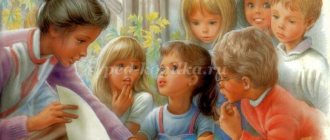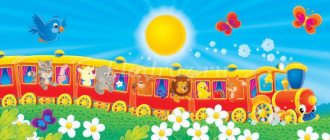MAGAZINE Preschooler.RF
Topic KINDERGARTEN Author: N.V. Grebenkina, speech therapist of the highest qualification category Subject dictionary. Building, floor, room (group, hygiene), bedroom, locker room, hall (music, sports), office (speech therapist, doctor, nurses, psychologist, speech pathologist, head of kindergarten, etc.), block (therapeutic), kitchen, veranda, area (for walks), head of kindergarten, teacher, speech therapist, doctor, nurse, cook, music director, psychologist, speech pathologist, physical education instructor, teacher's assistant, child, furniture, dishes, toy, book, activity , walk, game, sleep, lunch, breakfast, afternoon snack, morning, afternoon, evening, hours. Action Dictionary. Come, greet, teach, educate, treat, develop, have breakfast, lunch, play, sleep, walk, study, draw, dance, sing, study, read, be friends, rejoice, relax, celebrate, look after, care, help, be on duty, dress, put on shoes, say goodbye, love, put up, respect, apologize, perform, train. Dictionary of signs.Our kindergarten (garden), first, second (floor), cozy, bright, clean, sunny, group (room), large, beautiful, music room (hall), friendly, young (teacher), caring, kind (teacher’s assistant), experienced (doctor), wooden (furniture), beautiful, woolen, colored (carpet), porcelain (dishes), steel, cutlery (cutlery), new, old, thin, thick, favorite (book), bright, colorful, plastic ( toy), cheerful (mood), joyful (meeting), strong (friendship), faithful (friend), good (health), interesting, early (morning), rainy (day), exciting (activity), loud (laughter), tasty, healthy, vitamin-rich (food), berries, fruits (juices). Adverbs. Left, right, straight, in the middle, friendly, together, interesting, fun, joyful, convenient, fast, clean, cozy, careful, beautiful, calm. Comparative adjectives. More comfortable, more beautiful, more comfortable, brighter, lighter. PROVERBS. PRAISE DAY BY EVENING. DON'T DO TO OTHERS WHAT YOU DON'T WISH FOR YOURSELF. YOU NEED NOT WORDS, BUT DEEDS, KNOW, CAT, YOUR BURN. WORKING LIKE A BEE. Idleness spoils a person. AND THE BEST FRIENDS HAVE TO SEPARATE. WHO CAME LATE WILL BE PICKED UP. GOOD ADVICE IS ALWAYS HELPFUL. ANYONE CAN MAKE A MISTAKE. DON'T POSTPUT FOR TOMORROW WHAT YOU CAN DO TODAY, DAMN IT. YOU CAN'T CORRECT EVIL WITH EVIL. DILIGENCE WITHOUT KNOWLEDGE IS FIRE WITHOUT LIGHT. WHAT WE DO WILLINGLY IS DONE EASILY. POETRY. WHY DO THEY SAY THIS? Kindergarten, kindergarten... Why do they say that? We are not aspen trees, we are not rowan trees. Vova, Tanya, Mishenki, These are not cherries! Kindergarten, kindergarten... Why do they say that? We are not flowers, Blue, scarlet - We are small guys! Kindergarten, kindergarten... Why do they say that? Because it’s a friendly place, We’re growing up as one family, That’s why they say, This is a kindergarten! (V. TOVARKOV.) I CAME TO KINDERGARTEN WITH MY MOTHER, I came to kindergarten with my mother, How can I stay alone? I told my mother directly: Take me home, I will be bored without you. But then Someone takes your hand. I didn’t have time to cry - the round dance began to spin. And then Vanya and I sat on the sofa, rode a horse with Masha and Alyosha. Look how many dolls there are! They all need to be rocked to sleep, I’m no longer bored, I just don’t have time to be bored. (I. DEMYANOV). MORNING. The pines are lined up in a row, the maples are under the window. The sun enters the kindergarten, along a bright path. The windows are shiny and clean, the floorboards have been washed. Wake up, kindergarten! Good afternoon guys! (V. DONNIKOVA.) NEW GIRL. New girl in kindergarten. I'll go to the new girl now. Why are you on the sidelines? It's boring to be alone. Here are our toys, Here is a clockwork elephant. Here are our cubes, We are building houses. You will also learn to Build yourself. Let's go, I'll take you to the guys. All girls like Kindergarten. CONNECTED SPEECH WHEN THEY ARE NOT BORED. The children were playing in kindergarten. Then everyone went for a walk. Nina was left alone. She has a cough. At first Nina was bored. Then I got to work. Nina put away the toys and books. I put the dolls to bed. And the girl watered the flowers. The guys are back. Thank you to your friend. Questions: 1. Where did the guys play? 2. Why was Nina left alone? 3. What did Nina do at first? 4. What work did the girl do? 5. What did the guys say? (Please note the use of different words: Nina, girl, friend.) OLDER FRIENDS. A kindergarten was opened next to the school. Schoolchildren prepared gifts for the kids. The girls sewed clothes for dolls. The boys made toy furniture. We bought picture books. At the matinee, schoolchildren gave gifts to the kids. The kids were glad to have guests and gifts. QUESTIONS: 1.Where was the kindergarten opened? 2.What gifts did the schoolchildren prepare? 3.What did you buy for the kids? 4.When did the schoolchildren give gifts? 5.Who and what were the kids happy about? GRAMMAR. SENIOR GROUP. Monday. 1. Change the nouns by numbers: child - children, doctor - doctors, teacher - teachers, speech therapist - speech therapists, room - rooms, hall - halls, shelf - shelves, closet - cabinets, chair - chairs, carpet - carpets, lamp - lamps , day - days, etc. 2. Make sentences with the preposition ON and two words (book - shelf, vase - table, picture - wall, cubes - floor, fur coat - hanger, flowers - flowerbed, children - street, leaves - trees.) Tuesday. 1. Form relative adjectives from nouns: a table made of wood - wooden, a bucket made of plastic - plastic, a plate made of porcelain - porcelain, a towel made of linen - linen, a cup made of glass - glass, a carpet made of wool - wool, a ball made of rubber - rubber, a down pillow is down, a cotton blanket is cotton, plum jam is plum, vegetable soup is vegetable, a fur hat is fur, a plasticine ball is plasticine. 2. Compiling sentences with the preposition UNDER and two words (ball - table, mushroom - tree, slippers - bed, boy - shower, kitten - sofa, mother - umbrella, boat - sail.) Wednesday. 1. Change the nouns by case (doll, table, towel, coat, flower, fish, snowman, airplane.) 2. Coordinate the pronouns MY, MY, MY, MY with the nouns: MY - scarf, ball, chair, soldier, pencil, flower, drawing, ball, house, cube. MINE – bed, doll, T-shirt, cup, clothes, jacket, stroller, fork, horse, hat. MINE – lotto, coffee, coat, face, towel, blanket, mirror, cocoa, bucket. MINE – boots, gloves, tights, cubes, balls, toys. Thursday. 1. Form nouns using diminutive - affectionate suffixes: Toy - toy, bed - crib, song - song, doll - doll, bucket - bucket, stroller - stroller, sun - sun, wind - breeze, sand - sand. 2. Coordinate adjectives with nouns: pillow (what?) - , ball (what?) - , book (what?) - , boots (what?) - , coat (what?) - etc. 3. Form possessives adjectives: Misha’s car, Olina’s watering can, Tanino’s blanket, etc. Friday. 1. Match the nouns with adjectives with opposite meanings: Clean hands - dirty hands, cheerful boy - sad boy, loud music - quiet music, light chocolate - dark chocolate, low fence - high fence, cold coffee - hot coffee, old book - new book, sour apple - sweet apple, white paper - black paper. 2.Change verbs according to persons and numbers: I draw, you draw, he draws, we draw, you draw, they draw, (play, love, dance, sing, give, sleep, dream, read.) GRAMMAR. MIDDLE GROUP. Monday. 1.Continue to learn to ask questions WHO? WHAT? to nouns: girl, ball, airplane, teacher, carpet, boy, table, mother, speech therapist, umbrella, cup, cat, spinning top, etc. 2. Change nouns by number: drum - drums, flag - , boy - , cube - , towel - , song - , activity - , girl - , chair - , car - , etc. Tuesday. 1. Coordinate the numerals ONE, ONE with the nouns: ONE - ball, scoop, carpet, cube, cockerel, boat, ball, table, wardrobe, soldier, etc. ONE - doll, hat, book, plate, lamp, napkin, mitten, bedside table, soap dish. 2. Use singular nouns. numbers in VIN. case: Misha was given (WHAT?) - a car, a book, a ball, candy, a boat, a cap, a flashlight, lotto. Sonya was given (WHO?) - a parrot, a kitten, a puppy, a hamster. Wednesday. 1. Use of masculine and feminine past tense verbs: The boy was sleeping, and the girl was sleeping. (read, play, draw, dine, jump, catch, run, sculpt.) 2. Use singular nouns. numbers in ROD. case without a preposition. No (WHAT?) - classes, breakfast, table, robot, napkin, cutlet, flashlight, picture. No (WHO?) - girlfriend, Kolya, doctor, comrade, mother, fish, Ira, cook, parrot. Thursday. 1. Form nouns using diminutive suffixes: Bedroom-bedroom, bunny-, doll-, song-, picture-, shoes-, beads-, staircase-, bread-. 2. Use singular nouns. numbers in PREV. case with the preposition “O”: I think (About WHAT?) - about a walk, about a film, about a book, about a car, about a meeting. I think (about WHOM?) - about a puppy, about a parrot, about a mother, about a kitten, about a girlfriend, about a bird. Friday. 1. Coordinate adjectives with nouns: Blanket (what?) - , cube (what?) - , pointer (what?) - , days (what?) - etc. 2. Compose simple non-common and common sentences. Answer the question: WHAT DO YOU DO IN THE MORNING? DAY? IN THE EVENING? PUZZLES. If your ear hurts, If your throat becomes dry, Don’t be scared and don’t cry, Because... (doctor) will help you. He teaches the children to be orderly, He checks the children's notebooks. It will teach children to write and read, and to add numbers and to subtract. (teacher) Since morning he has been cooking soup, compote and porridge in our kitchen. (cook) Shovels the snow, Sweeps the yard with a broom. Have you guys guessed who keeps it clean? (janitor) We go step by step And repeat: “tick-tock, tick-tock!” If we don't get started, we'll stop walking. (hours) I have a lot of things to do - Playing daughters and mothers. And now I want to sleep, And it’s calling me... (the bed) It hangs from the ceiling, Its pendants are made of glass, We’ll turn it on in the evening, And the room will become bright. (chandelier) PHYSICAL MINUTES. 1.Girls and boys. Girls and boys (children put their hands on their belts) Jump like balls (jumping in place) Stomp their feet (rhythmically stomp) Clap their hands (clap their hands) Blink their eyes (close their eyes) Then rest (lower their arms and bow their heads) 2. In the summer . In the summer, the children swam (imitate) They ran, walked (they run in place) In the summer, the children jumped, (jumping in place) And then they rested (put their hands under their cheeks) 3. Start a round dance, Start a round dance around the accordion - (children stand in a circle) Higher ears, Clap your hands (hands to the head and move your hands - these are ears) Top-top legs (rhythmically stomp) 4. The carousel started spinning. (children of 5-6 people sit around a hoop) The carousel spun and rushed off with the breeze. At first barely, and then run, run. La-la-la... They spun around, and then stopped. (take a hoop in their hands and pass it to the right, left to the rhythm of the song) DEVELOPMENT OF FINE MOTOR SKILLS. Little people. We ran along the river (movement of the index and middle fingers along the surface of the table to the edge) Children raced (repeat several times) Flower. A tall flower grew in a clearing, (fingers - a flower with closed petals) On a sunny morning, opened its petals (spread fingers). All petals receive beauty and nutrition (rhythmic movements of fingers together and apart). Together they give roots underground. (fingers - roots) Goats. A horned goat is walking, (“goat” with the right hand). A goat with a butt is walking, another one is rushing towards it, (“goat” with its left hand) ringing a bell. (“bell”) Hedgehog. The hedgehog stomped along the path and carried mushrooms in a basket. To count the mushrooms, you need to bend your fingers. (bend the fingers in turn, first on the left hand, then on the right hand).
| Next > |


